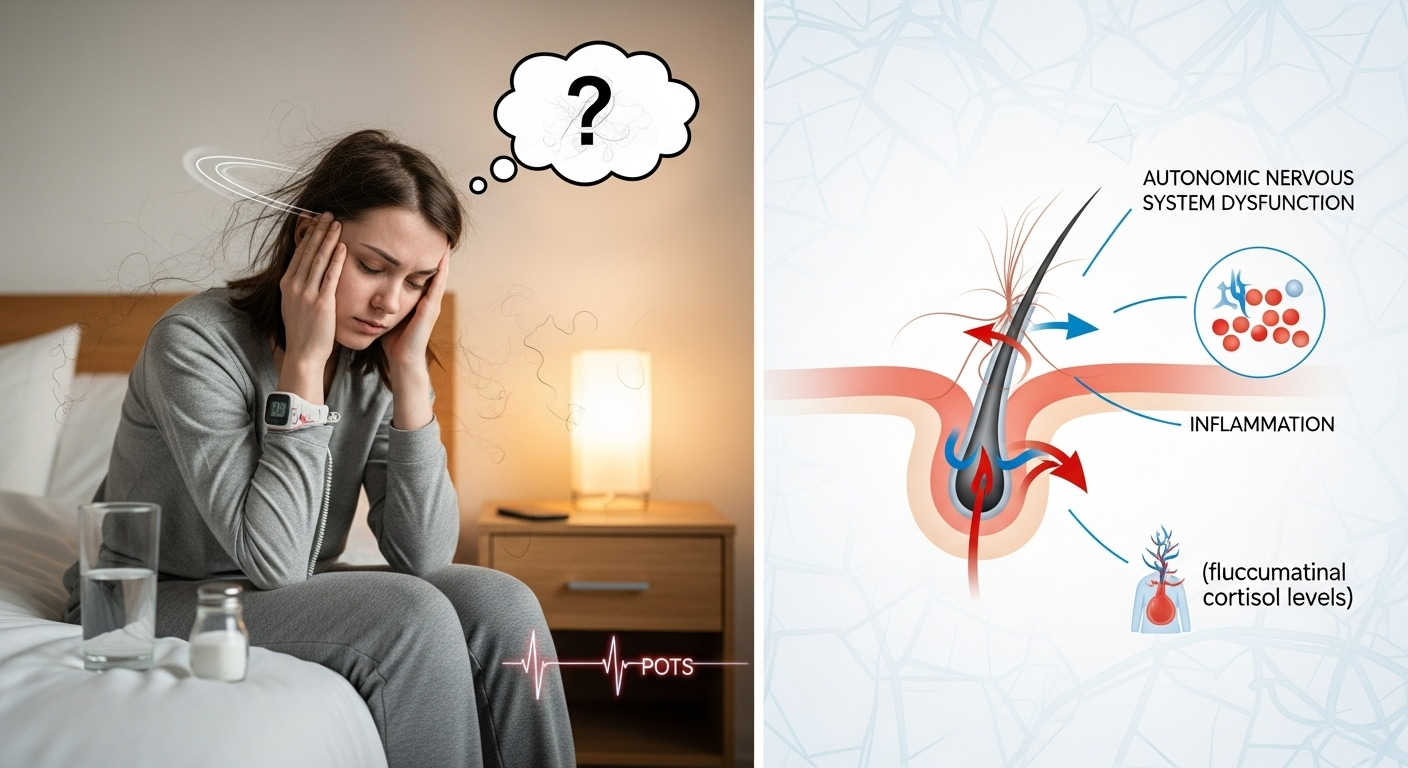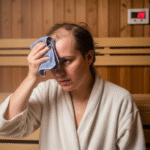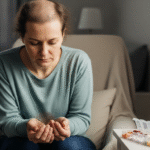If you're living with Postural Orthostatic Tachycardia Syndrome (POTS) and noticing more hair shedding than usual, you may be wondering if there's a connection. While POTS itself doesn’t directly cause hair loss, several factors associated with the condition can contribute to hair thinning. In this article, we’ll explore Can POTS Cause Hair Loss, the underlying …
If you’re living with Postural Orthostatic Tachycardia Syndrome (POTS) and noticing more hair shedding than usual, you may be wondering if there’s a connection. While POTS itself doesn’t directly cause hair loss, several factors associated with the condition can contribute to hair thinning.
In this article, we’ll explore Can POTS Cause Hair Loss, the underlying mechanisms, and expert-backed strategies to manage it. By the end, you’ll have a clearer understanding of what might be causing your hair thinning and how to address it.
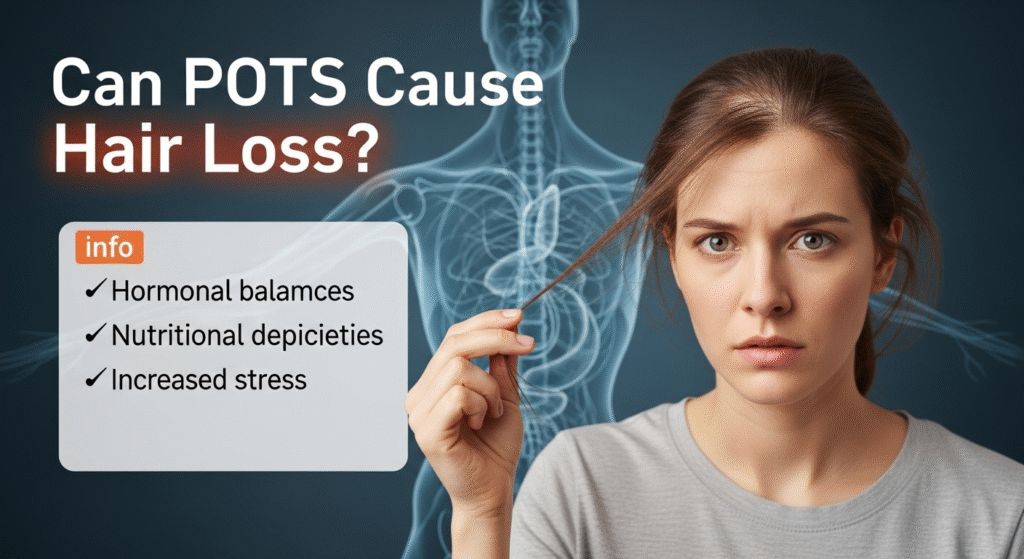
What Is POTS and How Does It Affect the Body?
Postural Orthostatic Tachycardia Syndrome (POTS) is a disorder that affects the autonomic nervous system, leading to abnormal heart rate and blood pressure regulation when transitioning from lying down to standing. This results in a rapid increase in heart rate (tachycardia) upon standing and can cause dizziness, fainting, and fatigue.
While POTS primarily impacts the cardiovascular and neurological systems, it can also affect other bodily functions, including the digestive system and hormone regulation.
- Symptoms: Common symptoms include:
- Dizziness or lightheadedness upon standing
- Fatigue and weakness
- Heart palpitations
- Brain fog or difficulty concentrating
- Impact on Daily Life: POTS can be debilitating, interfering with daily activities, work, and social life. Managing POTS often involves a combination of lifestyle changes, medication, and physical therapy.
Can POTS Cause Hair Loss?
While POTS itself doesn’t directly cause hair loss, the disorder’s associated factors can contribute to thinning hair. There are several reasons why individuals with POTS may experience hair shedding:
- Stress: Dealing with chronic symptoms of POTS, such as dizziness and fatigue, can be stressful. Stress is a known trigger for a condition called telogen effluvium, which causes hair to prematurely enter the shedding phase. This type of hair loss is typically temporary and reversible once the stressor is managed.
- Nutritional Deficiencies: Many people with POTS experience gastrointestinal symptoms such as nausea, bloating, and malabsorption, which can lead to deficiencies in essential vitamins and minerals necessary for hair health, including iron, zinc, and biotin. Poor nutrition can weaken hair follicles, leading to thinning hair.
- Hormonal Imbalances: POTS can affect hormone regulation, which in turn may impact hair growth. For example, chronic stress can disrupt the balance of hormones like cortisol, which can have a direct effect on the hair cycle.
Mechanisms Linking POTS to Hair Loss
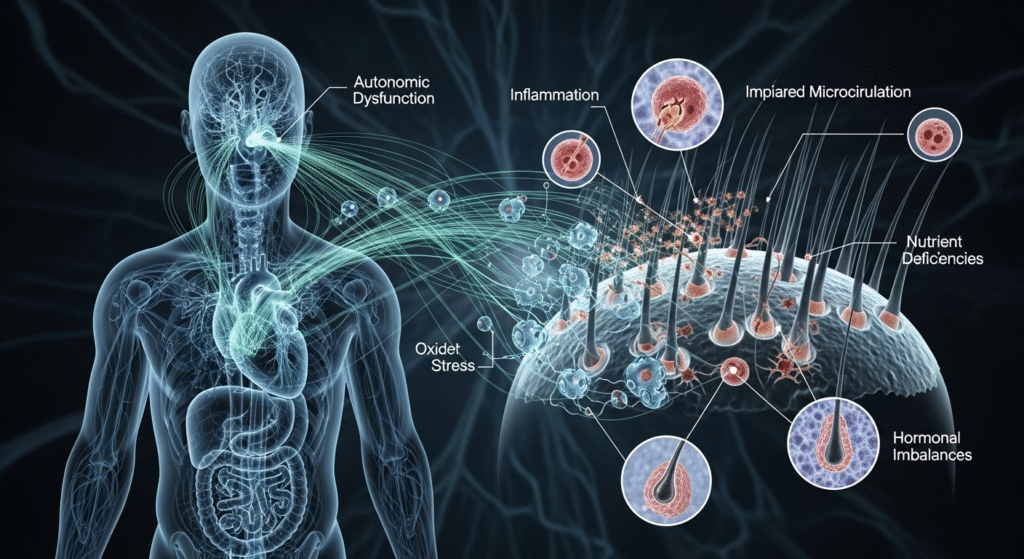
Several mechanisms may explain why people with POTS are more prone to hair loss:
- Autonomic Dysregulation: POTS is associated with impaired blood flow, particularly to the scalp. As a result, hair follicles may not receive adequate oxygen and nutrients, leading to weaker hair growth and shedding.
- Nutrient Absorption Issues: Gastrointestinal issues common in POTS, such as delayed gastric emptying and gut motility problems, can interfere with nutrient absorption. Deficiencies in vitamins and minerals, such as iron and zinc, are known to contribute to hair thinning.
- Hormonal Fluctuations: Chronic stress, a hallmark of living with POTS, can lead to an imbalance in stress hormones like cortisol. These hormonal fluctuations can trigger hair shedding, making it harder for hair to grow back.
Managing Hair Loss Associated with POTS
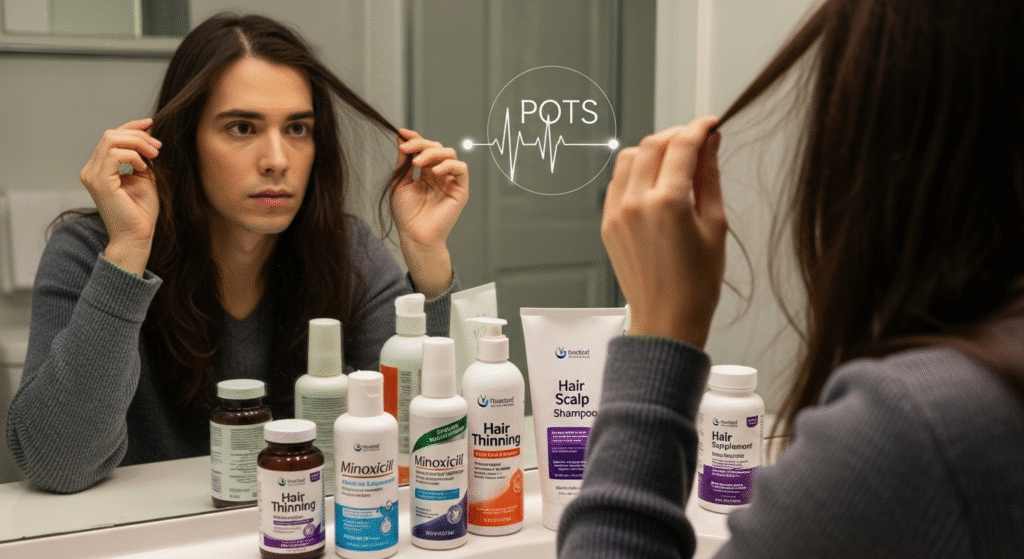
While hair loss associated with POTS can be frustrating, there are several management strategies you can employ to minimize thinning and promote regrowth:
- Consult Healthcare Providers: If you notice hair thinning, it’s important to discuss your symptoms with your healthcare provider. They may conduct tests to check for nutritional deficiencies or hormonal imbalances and suggest treatment options, such as supplements or changes to your medication.
- Nutritional Support: A diet rich in essential vitamins and minerals can help support healthy hair growth. Focus on foods high in iron (such as leafy greens, legumes, and lean meats), zinc (like pumpkin seeds and shellfish), and biotin (found in eggs and nuts).
- Stress Management: Managing the stress associated with POTS can help prevent telogen effluvium. Practices such as mindfulness meditation, yoga, and breathing exercises may help reduce stress and improve overall well-being.
- Hair Care Practices: Use gentle, sulfate-free hair products that nourish your scalp. Avoid excessive heat styling, tight hairstyles, or harsh chemical treatments that could further damage your hair.
When to Seek Medical Advice
If you notice any of the following, it may be time to seek medical advice:
- Persistent Hair Loss: If hair loss continues beyond six months or worsens despite addressing stress and nutrition, consult with a healthcare provider to rule out other underlying conditions.
- Scalp Issues: If you experience symptoms like redness, irritation, or itching along with hair loss, it could indicate a scalp condition like seborrheic dermatitis or fungal infection that requires professional treatment.
- Other Symptoms: If your hair loss is accompanied by fatigue, dizziness, or heart palpitations, it’s important to seek a comprehensive evaluation to ensure that your POTS is being properly managed.
FAQs
Can POTS cause permanent hair loss?
No, hair loss due to POTS is typically temporary and reversible with proper management.
Are there specific treatments for hair loss in POTS patients?
Treatment focuses on addressing underlying causes like nutritional deficiencies, stress, and hormone imbalances. Supplements and stress management techniques can help support hair growth.
How can I prevent hair loss while managing POTS?
Maintaining a balanced diet, managing stress, and consulting with your healthcare provider about potential medication changes are key to preventing further hair loss.
Is hair loss a common issue for POTS patients?
While not all patients experience hair loss, it is a known issue for some due to the factors associated with POTS, such as stress and nutrient deficiencies.
When should I see a doctor about hair loss?
If hair loss is severe, persistent, or accompanied by other symptoms like fatigue or dizziness, it’s important to consult a doctor for further evaluation.
Conclusion:
While Postural Orthostatic Tachycardia Syndrome (POTS) doesn’t directly cause hair loss, it can create conditions that contribute to hair thinning, including stress, nutritional deficiencies, and hormonal imbalances. Understanding these factors is crucial in managing hair loss.
By addressing the underlying causes and seeking expert advice, you can minimize hair thinning and promote healthier hair growth.Consult with Dr. Uzma Irfan, an ISHRS-certified surgeon in Islamabad today,to tailor solutions to your specific needs.

